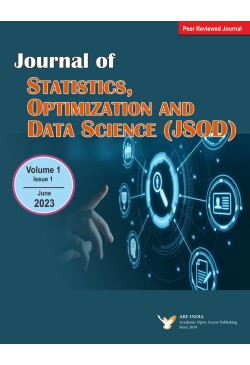
Journal of Statistics, Optimization and Data Science
Frequency :Bi-Annual
ISSN :2583-9462
Peer Reviewed Journal
Optimal algorithm to Solve Transportation problem with Hexagonal Fuzzy Numbers
The present study focus is to deal with transportation problem. It is one of crucial and important topic that helps to optimize the transportation cost, time, space etc. Here, a new algorithm is proposed to find optimal solutions to the fuzzy transportation problem. Further, ranking methodology is used to defuzzify the hexagonal fuzzy numbers to get optimal solution. The results of the proposed technique give best optimal solution as compared with existing algorithms. Finally, the validity of the proposed method is illustrated with the numerical example. We recommend that, proposed algorithm will be fruitful for dealing with similar kind of study.
KEYWORDS: Transportation; fuzzy; optimality; ranking; Hexagonal fuzzy numbers
Prediction of Outcome of Twenty20 (T20) Cricket Using Classification Techniques
In the field of sports analytics, cricket stands out as a fascinating domain where data science ignites unparalleled curiosity and drives innovation. In our study, we delve into the dynamic realm of Twenty20 (T20) cricket, leveraging advanced data science techniques to predict match outcomes with unprecedented accuracy. Harnessing the inputs—such as first-inning performance, venue characteristics, toss outcomes, match timing, and partnership scores—we endeavor to forecast match results midway through the game. Our model draws strength from a comprehensive training dataset spanning T20 matches from 2011 to 2021, ensuring robustness and reliability in its predictions. Employing the machine learning algorithms like Random Forest, Na¨?ve Bayes, and Support Vector Machine (SVM), we meticulously analyze and compare their efficacy in this predictive task. Notably, the Random Forest classifier emerges as a beacon of performance, excelling across diverse scenarios with its adept handling of both continuous and categorical variables. We have meticulously crafted an intuitive dashboard using R-Shiny. This user-friendly interface empowers to make informed decisions swiftly, transforming raw data into actionable intelligence. In essence, the paper not only showcases the symbiotic relationship between cricket and data science but also underscores the transformative prospective of predictive analytics in shaping the future of sports strategy and decision-making.
KEYWORDS: Runs, Accuracy, Team, Kappa value, Prediction and Outcome